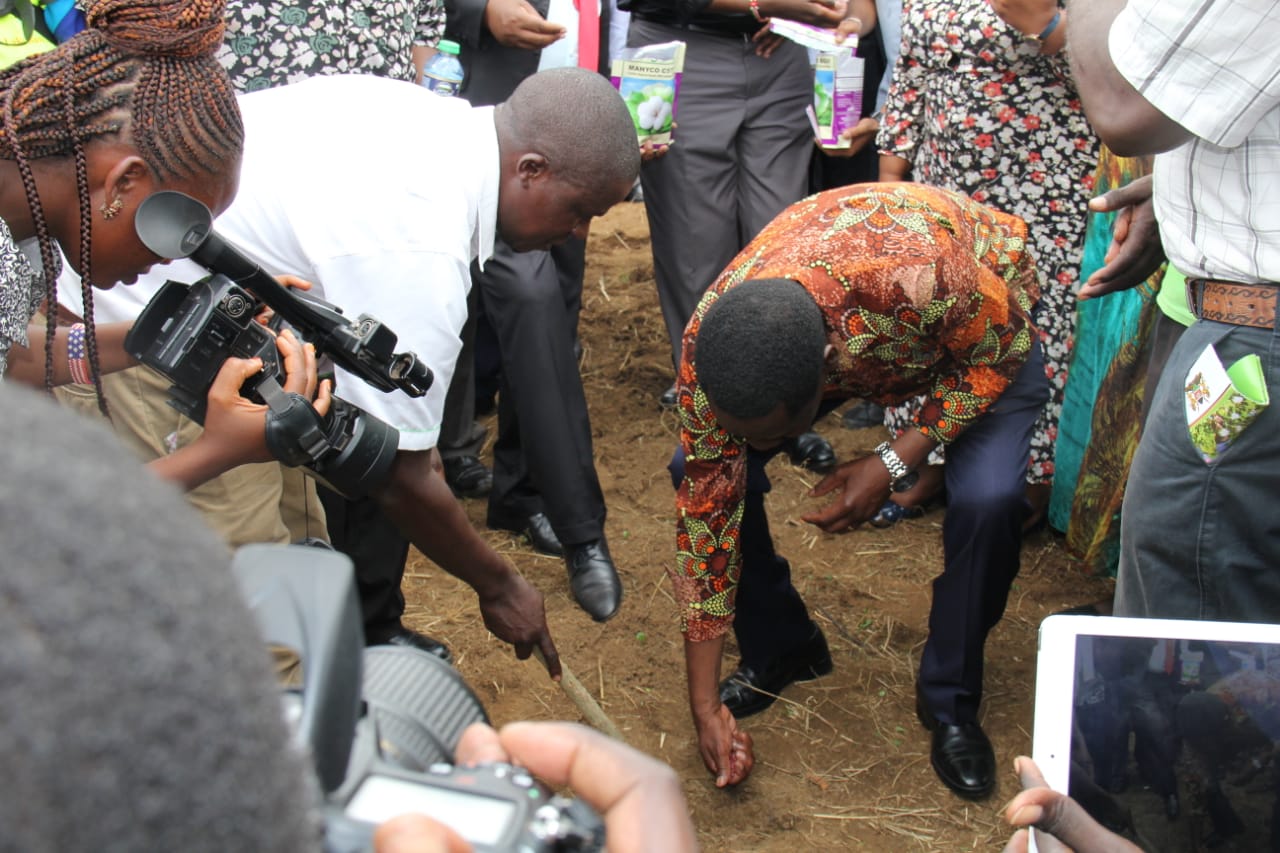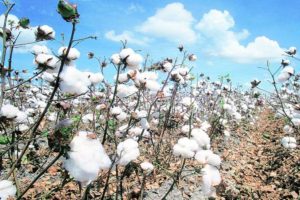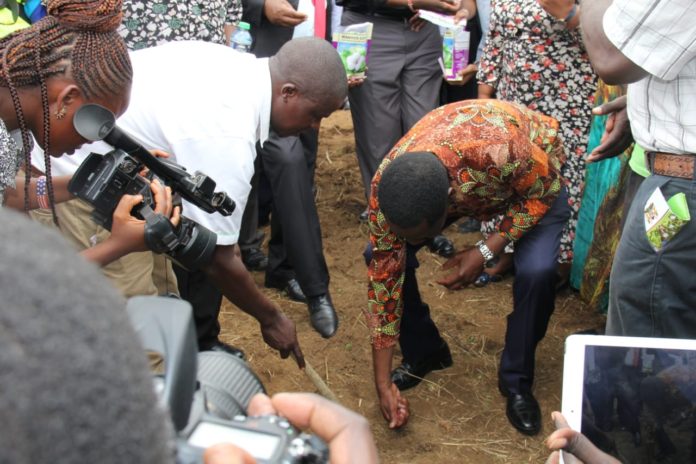|
Getting your Trinity Audio player ready...
|
By Okong’o Oduya
Busia County, Kenya: The first-ever BT Cotton was recently launched in Western Kenya.
While addressing farmers, Cabinet Secretary ( CS) Ministry of Agriculture Peter Munya confirmed that the national government had promised to pump more money in reviving the cotton industry in Kenya. “The government through the ministry of agriculture has promised to invest more in technology to boost up cotton farming in Kenya,” he said.
While meeting cotton farmers at Alupe university ground in Busia county during the launch of the first BT cotton seed, Munya said cotton production and textile industry used to be a major employment and income earner for many communities Kenya before the industry went down in the 1990s leaving industries such as KIKOMI and RIVATEX paralyzed.
BT (Thuringiensis Bacillus) cotton is a genetically modified organism (GMO) or genetically modified pest-resistant plant cotton variety, which produces an insecticide to combat bollworm.
The CS blamed bad policies being the reason as to why major cash crops such as cotton, pyrethrum, and coffee went down or are not doing well as it should be. However, Munya said with research and invention of new technology such as BT cotton will help turn things around within the shortest time possible.

“With the advancement of science and technology such as BT cotton the opportunities that now exist will turn the sector around quickly.”He said.
He urged farmers to move with the speed and embrace the farming as one way of reviving cotton industry which he said will also open up employment opportunities adding that the national government is committed enough to revive all agriculture value chains which include coffee, tea, dairy, and sugarcane farming among others, among them, increasing budget allocation in the agricultural sector.
He further said the cabinet has already approved the commercial farming of BT cotton in the country after successful research on the cotton was conducted.
Munya also said that Busia as a county and western region at large enjoy good climate and weather patterns favoring cotton farming, a move that forced the government to chose Busia as the best county to launch cotton in the country.
CS said Kenya has joined five other African countries to adopt the planting of BT cotton after, Sudan, Malawi, South Africa, Ethiopia, Algeria, and Eswatini. He said the government has set aside 1000 farms across the country to offer training opportunities to farmers willing to venture into farming.
“Kenya is now joining six other countries that have already taken up BT cotton which include South Africa, Sudan, Malawi, Ethiopia, Algeria and Eswatini this means the continent is slowly picking the pace in the adoption of this Modern cotton farming technology,” he said.
 Munya said the improved varieties of cotton will boost cotton production due to resistance to paste and other climate conditions besides maturing a month earlier than the normal cotton.
Munya said the improved varieties of cotton will boost cotton production due to resistance to paste and other climate conditions besides maturing a month earlier than the normal cotton.
His devolution counterpart Eugine Wamalwa said the government is fully dedicated to making sure cotton farming is fully adopted in the country. He further revealed that they will be revamping all stalled ginneries in the county at Mulwanda, Nambale, Malaba, and Katakwa respectively.
“With the launching of BT cotton I want to assure you as a government, we will make sure that we provide a ready market to the farm produce, by reviving all stalled ginneries in the county. The Mulwanda ginnery in Funyula and Katakwa ginnery in Teso North will be given priority,” he said.
Busia governor Sospeter Ojaamong said with the invention of new technology in cotton farming it will help in eliminating destructive worms to the crop. He said his government will offer training to farmers across the county in a way to boost cotton farming. He noted that once the farming of the crop fully picks up it will improve people living standards in the county.
He also urged the national government to pump more resources towards the textile industry to provide a ready market for the cotton.
Dr. Magret Karembu is the Director ISAAA AfriCenter and coordinator OFAB KENYA Poor yields from small scale cotton farmers in Kenya and Africa at large says there has been a long-standing problem on BT cotton farming with no impact even after releasing new varieties of cotton or by other recommendations made on the basis of research findings.
She said the adoption of BT cotton is expected to boost cotton productivity not just in Kenya adding that so far there are 25M hectares of land covered by BT cotton globally.
“Five years of so Africa will be able to deliver four more new biotech crops in the global basket but this will only be achieved if we will be able to get the policies in place and our regulatory systems approve some of the most advanced research that is already completed by our African scientist”, she said.
Busia women representative Florence Mutua asked the relevant entities to make sure farmers get seeds and farm imputes on time especially now that the long rains are here. She, however, called upon the government to construct the textile industry within the region adding that RIVATEX has far located from the farmer a move she said will reduce cost in delivering the product to the factory.
Dr. Charles Waturu the lead scientist on BT cotton said the cotton is the key driver towards the expansion of the textile industry in Kenya if well-practiced. He raised the fear that despite the fact that the crop is a multipurpose crop with lint and seeds being the principal products, the cotton is still low in production, where the country records 25,000 bales yearly.
He associated the low production of cotton to numerous challenges including pest infestation. He said that pest control in cotton production takes on average 45 percent of all production costs which contributed to the collapse of the cotton in Kenya.
He further said with modern technology such as BT cotton offers a viable contribution to address the emerging challenges. According to him, BT cotton does not require 12 sprays per season like any other species of cotton to about 3-4 per season, which is beneficial not only to the environment but also to human health.
Besides BT cotton Dr. Waturu encouraged farmers to embrace hybrid cotton farming as they wait for full takeover of BT cotton, the farmers will still reap big on the hybrid. Funyula Member of Parliament Dr. Oundo Mudenyo and his Teso North counterpart Oku Kaunya called upon the National government to revive all stalled ginneries in the County to provide a market to the cotton.
Mulwanda ginnery in Funyula and Katakwa ginnery in Teso North constituencies in Busia county collapsed years ago affecting cotton farming and production in the County.
According to Professor Dorrington Ogoyi, CEO National Bio-Safety Authority says, the authority already has action from the government on GMO regulations that will help them to facilitate responsible research and minimize the risk of genetically modified organisms, with respect to human, animal health and environment.














